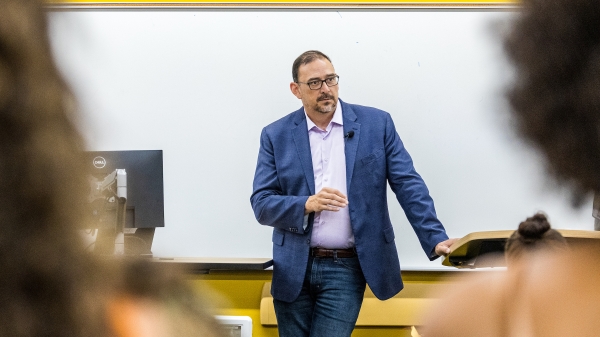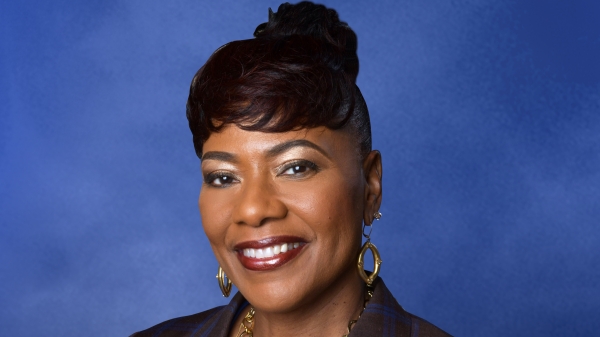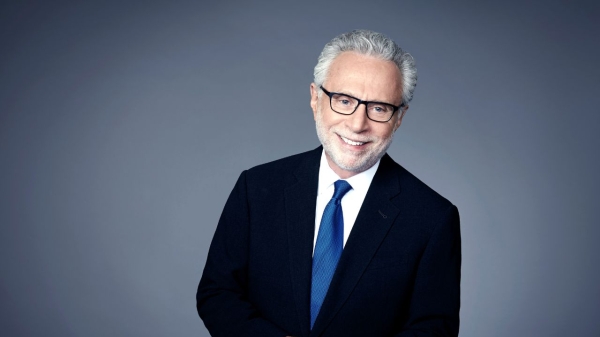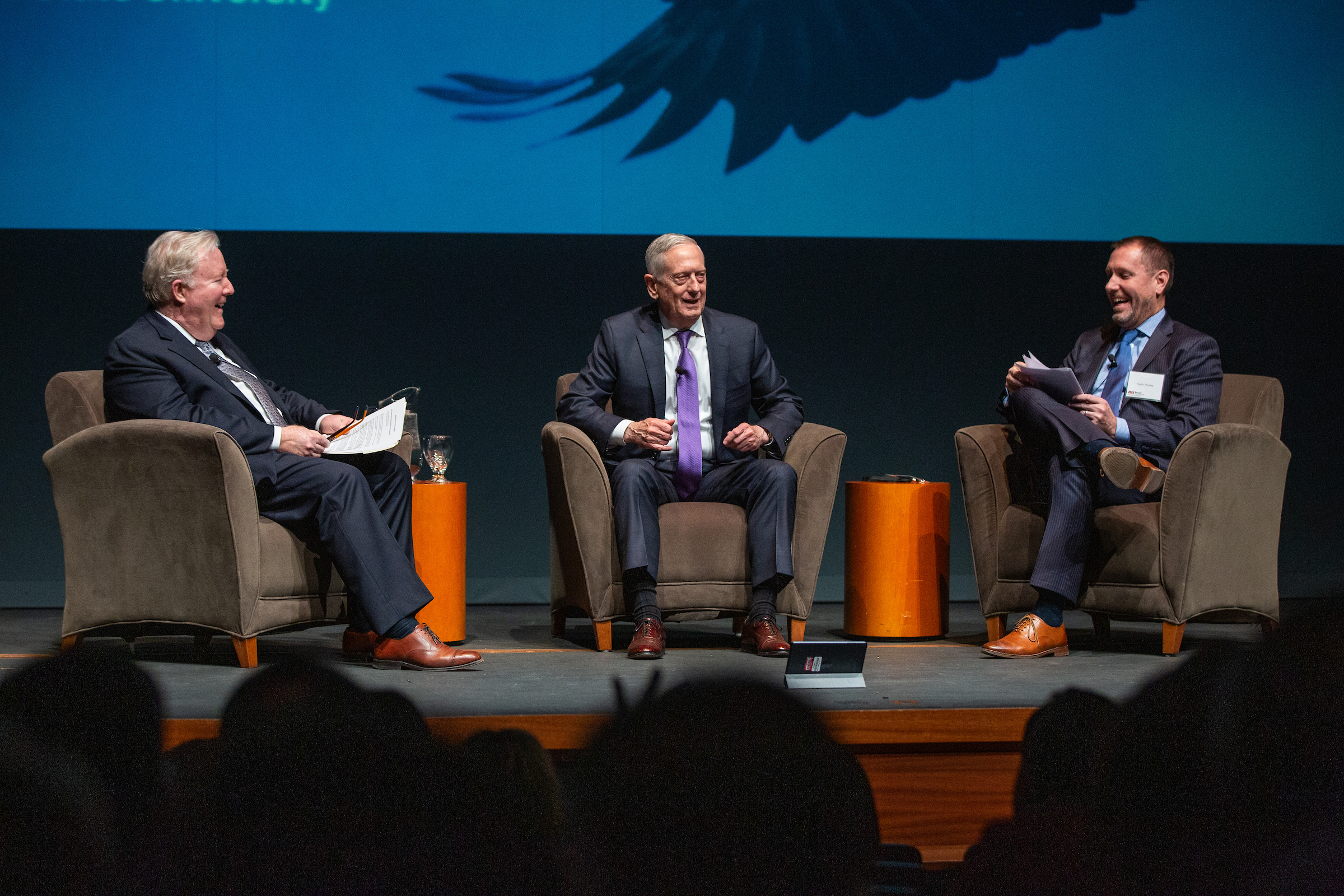Former secretary of defense says that alliance-building is key to managing threats from China and Russia

America is facing threats from the world’s other superpowers, and the only way to stave them off is to foster strong relationships with other countries, according to James Mattis, the former U.S. secretary of defense.
“Allies, allies, allies. If you take the time to align the international community, you can modify other nations’ behavior. It does work,” said Mattis, who addressed a crowd at Tempe Center for the Arts on Wednesday night. His talk, titled “Thwarting Threats and Nurturing Allies in Today’s Global Affairs,” was the annual John J. Rhodes Lecture in Public Policy and American Institutions, presented by Barrett, The Honors College at Arizona State University.
Mattis, a retired four-star general in the U.S. Marine Corps, served as secretary of defense from January 2017 until January 2019. In late 2018, Mattis announced that he planned to resign over President Donald Trump’s decision to withdraw all American troops from Syria. An angry Trump then moved up Mattis’ resignation date, essentially firing him.
“You all paid my tuition for over 40 years to learn how to defend this country, and I don’t know how to do it without allies,” he said.
“We need radar in South Korea and Japan to protect us from North Korea, so we need those allies.”
Mattis sees Russia and China as significant threats to the United States. In his resignation letter to Trump, he said those countries “… want to shape a world consistent with their authoritarian model.”
In his talk Wednesday night, Mattis said that the United States tried to deal with Russian President Vladimir Putin as a “rational and contributing member” of the international community in the 2000s and late 1990s, but it didn’t work.
“No nation has talked about such cavalier use of nuclear weapons as Russia under Putin,” he said.
“He mucked around in our elections, even if some people don’t believe it. He’s done his level best to change the borders in Europe, and now we have to deal with Putin as he is, not as the Putin we want.”
Mark Jacobs (left), dean of Barrett, The Honors College, and Taylor Rhodes (right), grandson of John Rhodes, take turns asking James Mattis questions about his career, service and global issues during the 2020 John J. Rhodes Lecture in Public Policy and American Institutions at the Tempe Center for the Arts on Wednesday. Photo by Deanna Dent/ASU Now
Mattis believes China is untrustworthy and says that although our two countries’ economies are entwined, our political systems can never be.
“We have to collaborate where we can, on North Korea, drug trafficking and terrorism,” he said.
“But there’s no counterweight to their political party. We thought that when we brought them into our economic world, they would liberalize politically, but it didn’t work. Look at what they’re doing in Hong Kong.
“We don’t share enough values with a country that treats its people the way they do. I don’t think we’ll ever see an alliance.”
Mattis, who served as NATO's Supreme Allied Commander Transformation from 2007 to 2010, said that one of America’s greatest accomplishments was helping to rebuild the defeated countries after World War II.
“We went to our former foes and allies and helped put them back on their feet economically,” he said.
He is a strong believer in the balance of diplomacy and military might.
“My job was to run the military operations, but my real job was to keep the peace for one more year, one more month, one more week, one more day, one more hour while the diplomats worked their magic,” he said.
“America is a great power, but our two fundamental sources of power are the power of inspiration and the power of intimidation. In an imperfect world, we need a military so tough that they want to deal with our diplomats.”
For Mattis, alliance building started at home. Before he was even confirmed as secretary of defense, he met with Rex Tillerson, the secretary of state.
“I told him that for most of my career, the secretary of state and the secretary of defense wouldn’t cross the Potomac to shake hands with each other,” he said.
“They had militarized foreign policy since the Berlin Wall came down, and we needed to get diplomacy back in the driver’s seat."
So Mattis and Tillerson met weekly.
“It was a very powerful way to go into decision-making, and it helped me a great deal on budgeting because it allowed bipartisan support,” Mattis said.
But their alliance was short-lived. Trump fired Tillerson in March 2018, and Mattis left nine months later.
In fact, Mattis was the second Rhodes lecturer to leave the administration after being at cross purposes with Trump. The 2019 lecturer was John Brennan, who served as director of the Central Intelligence Agency from 2013 to 2017 before having his security clearance revoked by Trump.
Since his departure, Mattis has not spoken publicly about Trump, and he didn’t speak specifically about the president on Wednesday night. He did say: “I wanted to go four years and I left at two because I would not be party to going back on our word. We have to learn that we have to stick with our word.”
Mattis’ talk was moderated by Mark Jacobs, dean of Barrett, and Taylor Rhodes, CEO of Applied Systems and the grandson of John Rhodes. Rhodes said his grandfather was the embodiment of a public servant, and he asked Mattis how Americans can overcome their disillusionment with the divisive nature of the country today.
Mattis responded that America still has a potent power of inspiration, which is its strongest asset. He recounted the story of visiting a Marine outpost in Syria, where a local man was held after being caught trying to set a bomb in the road. Mattis talked to the man, who said his rage over his war-torn country led him to try to kill American troops. After being told he would be imprisoned, he asked Mattis whether, if he was a model prisoner, he and his family could eventually immigrate to America.
“The power of inspiration can go halfway around the world to a man filled with hate. He would love to sit here and have his daughters go to this school,” he said.
“On our worst day, we’re still the best thing going.”
Top image: Former U.S. Secretary of Defense James Mattis was the speaker at the annual John J. Rhodes Lecture in Public Policy and American Institutions at the Tempe Center for the Arts on Wednesday. Photo by Deanna Dent/ASU Now
More Law, journalism and politics

Arizona secretary of state encourages students to vote
Arizona Secretary of State Adrian Fontes looked right and left, taking in the more than 100 students who gathered to hear him speak in room 103 of Wilson Hall.He then told the students in the Intro…

Peace advocate Bernice A. King to speak at ASU in October
Bernice A. King is committed to creating a more peaceful, just and humane world through nonviolent social change.“We cannot afford as normal the presence of injustice, inhumanity and violence,…

CNN’s Wolf Blitzer to receive 41st Walter Cronkite Award for Excellence in Journalism
Wolf Blitzer, the longtime CNN journalist and anchor of “The Situation Room With Wolf Blitzer,” will accept the 41st Walter Cronkite Award for Excellence in Journalism, Arizona State University has…
